Alfred Marcus Offers Technology Management Strategies in New Book
Friday, February 19, 2016
Professor Alfred Marcus’ latest book, The Future of Technology Management and the Business Environment: Lessons on Innovation, Disruption, and Strategy Execution, was recently published by Pearson FT Press.
Emerging technologies offer immense promise for generating growth, profitability, and prosperity. But they face major obstacles to commercialization and have environmental and social costs that must be carefully managed to maximize the benefit and mitigate the harm.
This book is about the foresight and strategic actions required for these new technologies to play a positive rather than a negative role. Marcus illuminates their potential, reviews the risky decisions needed to transform potential into reality, and discusses how technologies might be used to ameliorate social problems rather than exacerbate them.
Marcus begins with insights about the strategy of technological innovation, using case studies to show why these innovations can fail, and offering methods for dealing with uncertain outcomes. Next, using examples such as the Deepwater Horizon oil spill, he illustrates how to better manage the dangers associated with technologies. He then turns to technology’s impact on three key societal conflicts: that between young and old, rich and poor, and the potential for scarcity and abundance in energy production. Finally, he focuses on how several pairs of companies, including Intel and AMD, Dell and Acer, and Amazon and Barnes & Noble, have managed technological disruption in their industries, and the difficult challenges they now face in overcoming these challenges.
Marcus is the Edson Spence Chair of Strategy and Technological Leadership at the Carlson School. He is the author and co-author of many books, including Management Strategy, Strategic Foresight, Big Winners and Big Losers, and Innovations in Sustainability, published last year.
